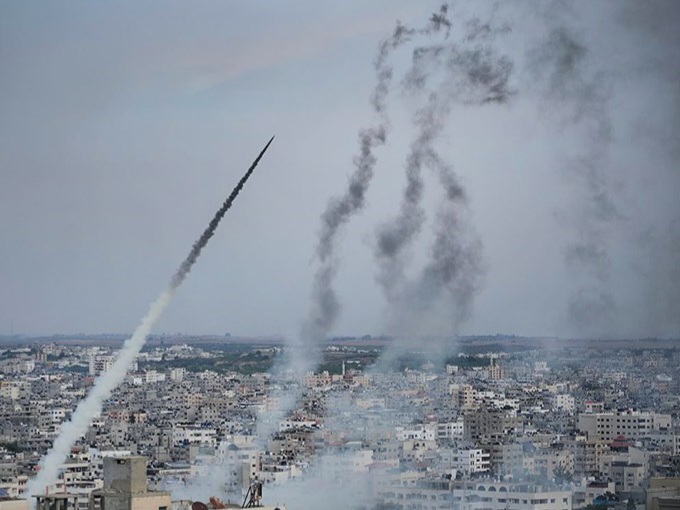
By Stacy M. Brown, NNPA Newswire Senior National Correspondent
The conflict in Israel has triggered a cascade of far-reaching consequences, resonating globally. The strife has spurred widespread protests in major cities worldwide, with demonstrators advocating for peace and justice in the region. Concurrently, the United States has witnessed a surge in hate crimes, reflecting the heightened tensions and polarized sentiments surrounding the issue.
The enduring debate surrounding Israel’s perceived occupation of Palestine continues to be a focal point of discussion, with proponents and critics engaging in a fervent exchange of perspectives. The multifaceted developments underscore the intricate interplay of political, social, and international forces in the ongoing conflict.
As the conflict continues to escalate, up to 600 Americans find themselves stranded in Gaza, grappling with dwindling essential supplies and a dire humanitarian situation. The State Department has reported that access to clean water, food, fuel, and medical provisions has become increasingly scarce.
In retaliation for Hamas attacks on Israel, the Israeli government has enforced a blockade, leaving Gaza without electricity for several days. The toll of the conflict is stark: over 2,450 casualties and 9,200 injuries have been reported in Gaza, while in Israel, 1,400 individuals have lost their lives and 3,500 have been wounded.
Among the casualties are 30 Americans, victims of Hamas’ attack on Israel and the ensuing warfare, according to a State Department spokesperson. Automated emails and ambiguous phone calls from the State Department have hampered efforts to ensure the safety of Palestinian Americans, leaving families uncertain about evacuation prospects.
The Rafah crossing, a vital gateway, remains closed, further complicating exit strategies. Additionally, the hub has suffered physical damage from Israeli airstrikes in Gaza.
At home, protests have intensified as well as hate crimes. In a horrifying incident in Illinois, a 6-year-old boy was tragically stabbed to death, and his mother – both Lebanese – critically wounded in an alleged anti-Muslim hate crime. Joseph Czuba, 71, the landlord, is accused of the brutal attack, which authorities attribute to the ongoing Middle Eastern conflict. President Biden swiftly condemned the attack, categorizing it as a hate crime.
Biden has warned Israel sternly, cautioning against an occupation of Gaza during the planned major ground assault in response to the Hamas terror attack. Meanwhile, discussions are underway regarding a potential solidarity visit by Biden to Israel.
Israel has announced the evacuation of 28 northern communities along the Lebanon border amid escalating attacks in the region concurrent with the ongoing conflict against Hamas. This move has raised concerns about the potential for a second war between Israel and Hezbollah, based in Lebanon.
Switzerland’s largest political party, the right-wing Swiss People’s Party, seeks to bolster its stance of neutrality, even as conflicts in Ukraine and the Middle East challenge non-alignment. The party aims to collect 100,000 signatures to initiate a vote on enshrining “everlasting” neutrality in the constitution, which could impact sanctions against Russia.
Amid escalating tensions, the U.S. reportedly has engaged in back-channel talks with Iran, cautioning against further escalation and potential intervention through Hezbollah. Israel’s emergency government, meanwhile, has mobilized 300,000 reservists in preparation for a major ground offensive.
Also, the international community continues to grapple with the potential for the conflict to extend beyond the region. U.K. Foreign Secretary James Cleverly urges Israel to minimize civilian casualties to prevent further escalation.
In the United States, reactions to the conflict vary, with Black Americans expressing various emotions. Many drew parallels between the struggles of Palestinians and African Americans in their fight against systemic racism, as highlighted through social media campaigns.
Through those lenses, many were reminded of former U.S. President Jimmy Carter’s past comments on the Israeli-Palestinian conflict, where he emphasized his belief in “the illegal occupation of Palestine.” In a 2006 PBS-TV interview, Carter discussed his book, “Palestine, Peace Not Apartheid,” regarding the Israeli-Palestine conflict.
“This apartheid, which is prevalent throughout the occupied territories, the subjection of the Palestinians to horrible abuse, is caused by a minority of Israelis — we’re not talking about racism, but talking about their desire to acquire, to occupy, to confiscate, and then to colonize Palestinian land,” Carter said. “So, the whole system is designed to separate through a ferocious system Israelis who live on Palestine territory and Palestinians who want to live on their own territory.”


